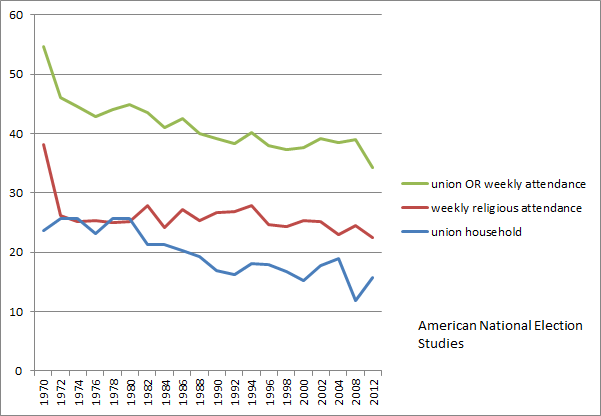- Facebook370
- Threads
- Bluesky
- Total 370
How could a celebrity with no governing experience and no grassroots infrastructure alienate and offend an outright majority of Americans, adopt positions far from the mainstream, and yet become our president?* I argue that the underlying reason is a hollowed-out democracy in which many citizens no longer expect to be represented by accountable organizations and are no longer invited to share in governing. A celebrity who offers symbolic politics has the number of followers and the level of attention that professional politicians strive to buy with their cash. In an environment of isolated citizens, he wins.
We still have plenty of voluntary associations and networks concerned with politics. But politics is a minority taste, so these groups draw a small proportion of the population. And because most of them attract members by offering a political message or agenda, they produce ideologically homogeneous groups.
We also still have very large numbers of professional advocacy organizations, but many of them are accountable to donors rather than members, and their capacity and vision come from their highly-skilled professional staff, not from citizens.
We also have some large movements that look accountable but aren’t. The Koch Brothers network, for example, employs 1,200 full-time, year-round staffers in 107 offices nationwide, more than the Republican Party. The Koch Brothers own it.
What we lack now are the kinds of organizations that I believe have been core to US civil society since the era of de Tocqueville. They offer benefits other than politics to attract members. They draw a range of people–not representative samples of the US population, but diverse groups. They give their members reasons to think politically and aggregate their political power. They create pathways to political leadership for those who become most interested. And they depend on their members’ support for survival.
In short, they offer what I’d call SPUD–Scale, Pluralism, Unity, Depth–which is the magic recipe for civic engagement.
Four traditional types of organizations that offered SPUD were unions, political parties dependent on local voluntary labor, religious congregations, and metropolitan daily newspapers. All four were imperfect, but each was much better than nothing. And they are all in bad shape today.
I’ve previously shown that newspapers have lost readership precipitously and parties have become loose networks of entrepreneurial politicians and donors instead of actual organizations. Unions and religious congregations have also shrunk. To illustrate those two trends, here is a new graph that shows the rates of union membership and weekly religious attendance. The top line is the proportion of adult Americans who either attend weekly services or belong to a union, or both. That proportion has dropped by twenty points, from a majority of 54.6 percent in 1970 to a minority of 34.3 percent in 2012. (By the way, I am skeptical that union membership really rose in 2012; I suspect that’s random noise.) I would look no further than this 20-point drop for the underlying conditions that yielded The Donald.

*The echo of Hamilton was inadvertent but seemed apt once I noticed it.

Peter — I agree with this, but think the diagnosis is strengthening by adding the work centered civic traditions of the country, as well as the associational ones. And we have glimpses of a remedy in what I’d call a civic nonviolence. Here is a column on Huffington Post with two stories. http://www.huffingtonpost.com/entry/587b9250e4b094e1aa9dc72b?timestamp=1484494186326